Camel Milk Benefits, Nutritional Value, And Side Effects
This wonder drink is a one-stop solution for managing liver and kidney issues.
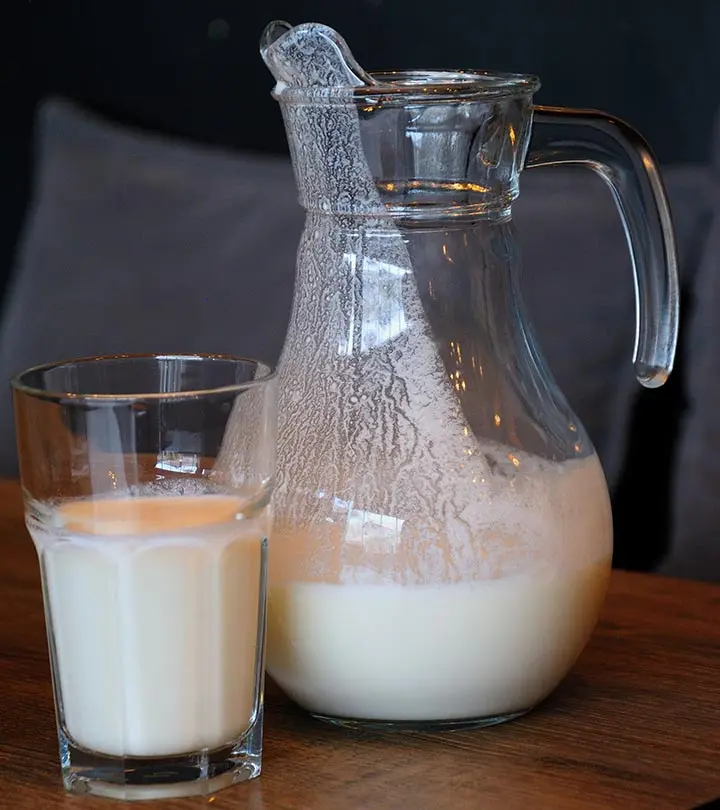
Image: Shutterstock
For centuries, camel milk has been a staple in many cultures, particularly in arid regions. Camel milk benefits are valued not only for its nutritional benefits but also for its traditional medicinal uses and its role in sustaining communities. It has abundant amounts of good fats and protein compared to other types of milk. It may help reduce the risk of cancer and diabetes (1).

One can reap all the benefits of camel milk when consumed as milk rather than in a powdered form. Learn more about the nutrition facts and health benefits of camel milk and how it compares with other types of milk. Continue reading.
 Know Your Ingredient: Camel Milk
Know Your Ingredient: Camel MilkWhat Is It?
An opaque liquid derived from camels that has a sharp taste and sweet odor.
What Are Its Benefits?
It improves immune system functioning, regulates blood sugar levels, and combats microbial infection.
Who Can Consume It?
Anybody can consume it, especially people with lactose intolerance.
How Often?
You can consume 1-2 cups daily.
Caution
Avoid consuming raw camel milk as it may increase the risk of food poisoning and cause bloating, diarrhea, or abdominal pain.
In This Article
What Are The Benefits Of Drinking Camel Milk?
You must have heard the various benefits of milk, but have you heard about the benefits of drinking camel milk? Camel milk is known for its anti-diabetic property. It may also prevent bacterial and viral infections. Making it a part of your diet may improve your immunity and protect against chronic disorders and cancer.
1. May Protect Your Liver
The nutrients in camel milk may help fight viruses that cause liver disease.
In studies, camel milk was found to be effective in decreasing the elevated levels of certain liver enzymes, which is a sign of improvement of liver health (2). It also increases the levels of total body proteins, which are depleted during liver disease (2).
In another study, whole camel milk was found to be effective against hepatitis C virus. The use of the milk has been recommended in patients infected with the virus. However, the efficacy of camel milk in this regard needs further research (3).
It controls the levels of liver enzymes (alanine aminotransferase (ALT) and aspartate aminotransferase (AST)). Camel milk reduced hepatitis viral load in 75% of the patients (3).
These effects could be due to the milk’s minerals (like iron and zinc) and proteins. They have potent antiviral, antibacterial, antifungal, and immunomodulatory effects (2), (3).
Camel milk supplementation, along with a controlled antiviral drug regimen, was found to have strong antiviral activity against hepatitis B and C viruses (3).
2. May Aid Diabetes Treatment

Camel milk may help regulate blood sugar levels in individuals with diabetes.
Experimental research and human studies show that camel milk can help improve blood sugar control. It can also reduce fasting blood sugar levels, decrease insulin resistance, improve cholesterol levels in those with diabetes, and promotes heart health (4).
In most of the human studies, the recommended dose of camel milk for those with diabetes was 500 mL per day (4).
In an experiment, diabetes-induced rats were fed camel milk for 30 days. The results showed a significant reduction in the levels of blood glucose, urea, uric acid, and creatininei A left-over compound released at a constant rate by the body. High levels of it can cause problems in the kidneys. in these rats. Their liver and lipidi A type of molecule made of hydrocarbons crucial for the functioning of human cells. Typical examples include fats and waxes. parameters were also close to healthy controls (5).
Camel milk aids in the increase of insulin-like growth factor-1 (IGF-1) which helps the body process sugar better: it increases glucose uptake in the body’s tissues and decreases how much sugar the liver makes, which improves insulin sensitivity (6).
Human subjects with juvenile diabetes showed a similar response. Camel milk had reduced blood sugar and HbA1C levels in the subjects (5). HbA1C is also known as glycated hemoglobin, and an increase in its levels elevates the risk of diabetes.
 Trivia
Trivia3. May Aid Cancer Treatment
Camel milk can induce cancer cell death, and this may aid cancer treatment.
In studies, camel milk stopped the spread of cancerous cells in human colorectal and breast cancer cell lines. It could achieve this by altering the expression of genes involved in the growth and metastasis (spreading) of tumors (7).
As per clinical data, camel milk proved to be effective against human cancer cells of the breast, larynx, and colon-rectum. Vitamins E and C, proteins like lysozyme and lactoferrin, and immunoglobulins play a critical role in cancer prevention (7).
This milk induces cell death and DNA damage in cancerous cells by triggering corresponding cellular mechanisms (7). However, more studies are warranted to confirm the findings.
4. May Improve Kidney Health

Camel milk was found to protect kidneys from an antibiotic overdose in rat studies. The antibiotic, called Gentamicin, is known to exert nephrotoxic (damaging to the kidneys) effects (8).
5. May Help Improve Symptoms Of Autism
Camel milk may help fight oxidative stress, which was found to cause some of the serious symptoms of autism.
Autism, or autism spectrum disorder (ASD), is a severe neurological disorder. It commonly sets in before the age of three. It is characterized by impairment in communication and cognitive and social behavior (9).
Research holds oxidative stress responsible for these issues. An increase in the levels of free radicals has shown to worsen autism and Alzheimer’s. Studies show that most individuals with autism have low levels of antioxidants (9).
A 4-year-old girl was fed camel milk for 40 days. Her autism symptoms were reported to disappear gradually. Another 15-year old boy showed similar results post a 30-day camel milk treatment. These patients were also observed to be quieter and less self-destructive after consuming camel milk (10).
6. May Combat Microbial Infections

The various proteins in camel milk can help fight several forms of bacteria.
In rat studies, camel milk was found to have antibacterial effects against E. coli and S. aureus. It also could improve antioxidant status, which was otherwise reduced by the pathogens (11).
With its abundant protein content, camel milk can reduce the bacterial count in your blood. It has microbe-killing enzymes like lysozyme, lactoferrin, and lactoperoxidase (11).
Camel milk proteins are similar to the ones you find in human saliva, tears, sweat, mucosal membranes, and milk. They limit the supply of nutrients essential for bacterial growth (11).
It has been found that regular use (almost overuse) of antibiotics may make several microbial strains resistant to medication. Pathogens like Staphylococcus aureus, Mycobacterium tuberculosis, Escherichia coli, and rotavirus could become immune to most antibiotic treatments. Hence, infections caused by them turn chronic within no time.
Supplementing antibiotics with camel milk may help eliminate several drug-resistant microbial strains from your body (11).
7. May Treat Disorders Of The Gastrointestinal Tract
Camel milk contains high levels of vitamins A, B, C, and E, magnesium, and zinc. They protect your gut from infections and oxidative stress.
As per rat studies, camel milk can reduce the severity of inflammatory ulcers and lesions (12). The rats showed about 60% ulcer inhibition when fed with 5 ml/kg of camel milk (12).
Camel milk appeared to strengthen the mucosal barrier. It also showed strong ulcer-healing effects. The gastroprotective property of camel milk needs further investigation to understand the actual compounds that are responsible for these effects (11).
8. May Soothe Allergies

Camel milk has a slightly different chemical makeup when compared to cow milk. Hence, it does not trigger lactose intolerance-related symptoms (13).
In studies, it also appears that camel milk has a positive effect on children with severe food allergies. This milk has immunoglobulins, unique proteins of the immune system. These immunoglobulins (a.k.a antibodies) interact with the allergens in your body. They neutralize the allergens and help treat allergies (10).
In another study, children with food allergies were given doses of camel milk. All 8 of them reacted well and recovered fully from their respective allergies. However, large-scale clinical trials are needed to validate these findings (14).
9. May Help Treat Autoimmune Diseases
Camel milk was found to reduce the levels of globulins, which are a part of a total protein in the human body. Elevated globulin levels were linked to autoimmune diseases, like ulcerative colitis and rheumatoid arthritis, among others (2).
The milk also contains alpha-hydroxyl acids that are known to treat autoimmune skin disorders like psoriasis and eczema (15).
Camel milk may show promise in treating asthma. It has immunoregulatory, anti-inflammatory, and antioxidant properties that may make it effective in treating the condition (16).
10. May Help Reduce The Risk Of Blood Clots
In a study, rats exposed to aluminum chloride showed an increase in their platelet count and improvement in clotting time after the administration of camel milk (17). In another study, camel milk, like cow milk, could help prevent blood clots in diabetic rats (18). The milk was also found to have better antidiabetic effects than cow milk. However, research in humans is lacking. More human studies are needed to further support these claims.
To enjoy these wondrous benefits, you can make a drink with camel milk by blending it with nutritious fruits, or drink it on its own. You can also use it in your tea and coffee.
Apart from the minerals and proteins we discussed, camel milk contains other nutrients that promote overall health. The following nutritional table can give you more reasons to start having camel milk.
Key Takeaways
- Along with protein and calcium, camel milk contains vitamins like A, B, C, D, and E that cow and buffalo milk might lack.
- Camel milk may help fight viruses that affect the liver, like hepatitis B virus, as it contains iron and zinc.
- The nutrients in camel milk may improve autism by fighting and helping with oxidative stress reduction.
- Adding camel milk to your diet may help lower blood sugar levels and reduce the risk of autoimmune diseases.
What Is The Nutritional Value Of Camel Milk?

Camel milk has (9):
- Protein: 3.1%
- Fat: 3.5%
- Lactose: 4.4%
- Ash: 0.79%
- Total solids: 11.9%
It has a very low percentage of carbohydrates. Camel milk contains most of the amino acids in fair amounts. Its proteins can be divided into two groups: caseins and whey proteins. Albumin, lactoferrin, immunoglobulins come under the whey group (10). It also has a significant amount of Vitamin B12, omega-3 fatty acids, and lactalbumin (19).
This milk contains low amounts of short-chain fatty acids but high amounts of long-chain fatty acids. Unsaturated fatty acids like linoleic acid are abundant, which is why camel milk has a better health quotient (10). Since it has a low-fat percentage, it may also help with weight loss or be good for people on a weight loss diet.
Camel milk also contains two other growth hormones other than IGF-1– brain-derived neurotrophic factor (BDNF), and transforming growth factor-beta (TGF-beta).
BDNF aids in neuronal growth which is essential for the improvement of learning and memory (20).
TGF-beta helps control cell activity, including cell growth and differentiation. It’s essential for the development of bones and the maintenance of body homeostasis (21).
It also contains vitamins, such as vitamins D, A, E, and B, and especially vitamin C, which cow and buffalo milk might lack. Minerals like calcium also appear to be relatively higher (10).
It is also believed to contain hormones like oxytocin (22). Oxytocin promotes stress reduction, and mood enhancement and acts as an energy boost (23).
This nutritional profile is not the only reason you need to consider replacing your other milk options with camel milk. In the following section, we will explore what makes camel milk so popular and how it is different from the all-time favorite, cow milk.
Why Is Camel Milk Popular? How Is It Different From Cow Milk?
The world is witnessing a sudden interest in camel milk. This is because research has proven the nutritional benefits of this milk. Camel milk has shown powerful antimicrobial effects (1).
Camel milk is a white, opaque liquid with a faint sweetish odor. It is low in fat when compared to cow milk but tastes similar – maybe a little saltier (as it contains more potassium and sodium than cow milk).
This milk has ingredients like immunoglobulins, vitamins B and C, potassium, magnesium, sodium, zinc, iron, and abundant proteins. Due to the high concentration of iron, it may even help people with anemia, though there are not enough studies to prove this (24). It is said to have an insulin-like protein, which gives it an anti-diabetic property. It also contains a higher proportion of zinc than other sources of milk. The immunoglobulins in camel milk may boost your immunity (1).
Interestingly, camel milk gets digested easily than cow, buffalo, goat, and donkey milk (1). Hence, it may suit even those with lactose intolerance. It contains slightly less lactose than cow milk (cow’s milk contains 4.8% lactose) (25).
Isn’t that surprising? This, probably, is the reason behind its popularity.
Procuring camel milk is a challenge for legal reasons. The U.S. FDA had issued a warning letter to an online seller of camel milk (26). Though you can buy camel milk online, looking at the statements made by the US FDA, we suggest you be wary of the claims made about camel milk online or otherwise.
 Trivia
TriviaThough camel milk doesn’t cause allergic reactions like other types of milk, it may have certain other downsides. We will look at them in the following section.
Does Drinking Camel Milk Have Side Effects?
There is not enough evidence to state the side effects of camel milk. This is probably because of the fewer impurities it contains when compared to other milk sources. Camel milk has almost no reports of toxicity.
But a major downside could be its price. Camel milk has high production costs. Some countries might have to pay hefty taxes to import them.
It is also not considered ethical farming and lacks the sustainability factor. Moreover, it has low shelf life. Yogurt and curd from camel milk also take longer to process and set. It also has high probiotics potential (27).
Whether camel milk should be boiled/pasteurized or unpasteurized (raw milk) is debatable. Boiling might deactivate the enzymes (lysozyme, lactoferrin, etc.), but a few believe it could kill bacteria. There is less research available to arrive at a conclusion.
Infographic: 5 Reasons To Include Camel Milk In Your Diet
While cow milk is the more popular option, many people do not know that camel milk might benefit your health in many ways. It is packed with essential nutrients and unique proteins that may help manage diabetes and improve kidney health among other things. Check out the infographic below to learn why you should add camel milk to your daily diet.

Illustration: StyleCraze Design Team
Camel milk is high in nutrients and antioxidants that help treat many ailments. It is commercially available in powdered or frozen forms. The health benefits of camel milk are numerous. Drinking camel milk may protect your liver, aid in diabetes treatment, act against colorectal and breast cancer cells, boost kidney health, and improve autism symptoms. However, future research on the long-term effects of camel milk on chronic diseases, its potential role in preventive healthcare, and how different processing methods affect its nutritional profile is still in the pipeline. It is crucial to note that camel milk is very expensive and has a low shelf life. Also, there are limited studies on its side effects. But you can still stick to a moderation intake to enjoy its benefits.
Frequently Asked Questions
Should camel milk be boiled before drinking?
As per the Food and Agriculture Organization of the United Nations, camel milk, when not consumed fresh, must be processed or boiled (28). But if you are buying camel milk that is processed, you may not have to boil it again. However, please check the directions on the pack.
Can pregnant women drink camel milk?
Yes. There are no known contraindications in this regard. However, please check with your doctor.
Does camel milk contain cholesterol?
Yes. But the levels are lower than that of cow milk (29).
Does camel milk help increase height?
No. There is no research to support this. Also, after a certain age, it is not possible to increase your height naturally.
How long does camel milk last?
Fresh camel milk lasts for 4 days when refrigerated. You can also freeze the milk, which will then have a shelf life of a year in the freezer. Once it thaws, the milk must be consumed within 3 days.
How much of camel milk can you drink in a day?
There is information on the specific dosage. You may drink probably a cup or two of the milk a day. However, make sure you talk to your doctor.
Is camel milk anti-aging?
Yes, the presence of alpha hydroxy acids in camel milk may make it an effective solution against the signs of aging. It helps soften the skin and reduce the appearance of wrinkles, thus aiding skin health (1).
Can I use camel milk on my face?
Yes, you can use camel milk on your face if you are not allergic to casein or dairy products. Camel milk contains lanolin that may help with skin hydration (30).
Can we drink camel milk daily?
Yes, you can drink camel milk daily as long as you are not allergic to it or have issues digesting it.
Is camel milk good for bones?
Yes, camel milk is good for bone health. The anti-inflammatory properties of camel milk may help treat rheumatoid arthritis (31).
Illustration: Camel Milk Benefits, Nutritional Value, And Side Effects
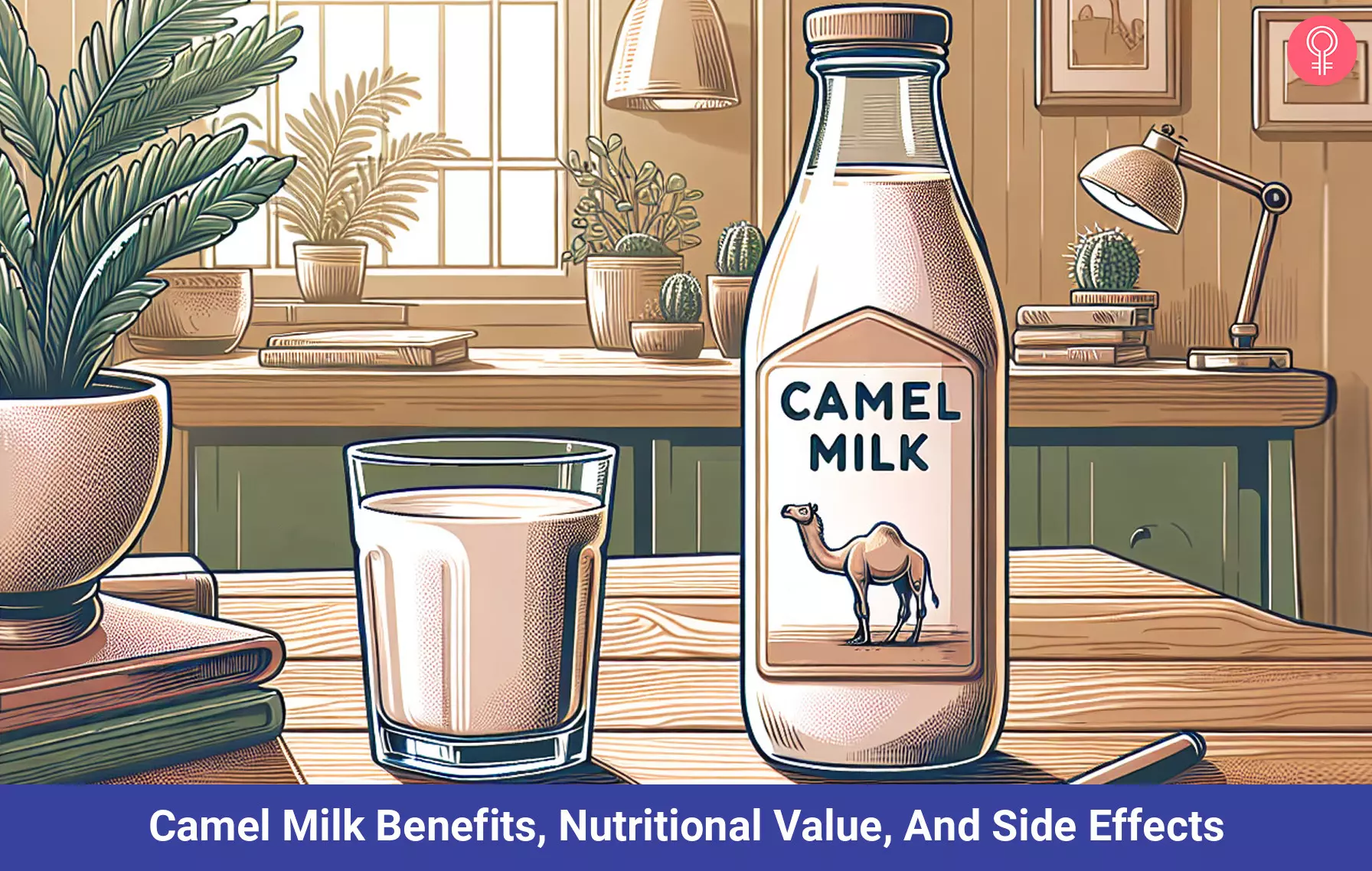
Image: Dall·E/StyleCraze Design Team
References
Articles on StyleCraze are backed by verified information from peer-reviewed and academic research papers, reputed organizations, research institutions, and medical associations to ensure accuracy and relevance. Read our editorial policy to learn more.
- Medicinal values of bioactive constituents of camel milk: A concise report, International Journal of Health Sciences, US National Library of Medicine, National Institutes of Health.
https://www.ncbi.nlm.nih.gov/pmc/articles/PMC5669503/ - Effect of Camel Milk Supplementation on Blood Parameters and Liver Function of Hepatitis Patients, American Journal of Ethnomedicine.
https://citeseerx.ist.psu.edu/viewdoc/download?doi=10.1.1.679.2942&rep=rep1&type=pdf - Influence of camel milk on the hepatitis C virus burden of infected patients, Experimental and Therapeutic Medicine, US National Library of Medicine, National Institutes of Health.
https://www.ncbi.nlm.nih.gov/pmc/articles/PMC5377298/ - Camel Milk Has Beneficial Effects on Diabetes Mellitus: A Systematic Review, International Journal of Endocrinology Metabolism, US National Library of Medicine, National Institutes of Health.
https://www.ncbi.nlm.nih.gov/pmc/articles/PMC5626114/ - A review on medicinal properties of Camel milk, World Journal of Pharmaceutical Sciences, Academia.
https://www.academia.edu/6245890/A_review_on_medicinal_properties_of_Camel_milk - The Effect of In Vitro-digestion on Mammalian Milks’ Insulin and IGF-1, Current Developments in Nutrition Journal, Oxford Academic.
https://academic.oup.com/cdn/article/4/Supplement_2/369/5845988 - Anticancer Activity of Camel Milk via Induction of Autophagic Death in Human Colorectal and Breast Cancer Cells, Asian Pacific Journal of Cancer Prevention, US National Library of Medicine, National Institutes of Health.
https://www.ncbi.nlm.nih.gov/pmc/articles/PMC6428541/ - Effect of camel milk against renal toxicity in experimental rats, Pakistan Journal of Pharmaceutical Sciences, US National Library of Medicine, National Institutes of Health.
https://pubmed.ncbi.nlm.nih.gov/28650321/ - Camel Milk as a Potential Therapy as an Antioxidant in Autism Spectrum Disorder (ASD), Evidence-Based Complementary and Alternative Medicine, US National Library of Medicine, National Institutes of Health.
https://www.ncbi.nlm.nih.gov/pmc/articles/PMC3773435/ - Nutritional and Therapeutic Characteristics of Camel Milk in Children: A Systematic Review, Electronic Physician, US National Library of Medicine, National Institutes of Health.
https://www.ncbi.nlm.nih.gov/pmc/articles/PMC4700900/ - Antimicrobial Effects of Camel Milk against Some Bacterial Pathogens, Journal of Food and Nutrition Research, US National Library of Medicine, National Institutes of Health.
https://citeseerx.ist.psu.edu/viewdoc/download?doi=10.1.1.925.2871&rep=rep1&type=pdf - Gastroprotective and Ulcer Healing Effects of Camel Milk and Urine in HCl/EtOH, Non-steroidal Anti-inflammatory Drugs (Indomethacin), and Water-Restraint Stress-induced Ulcer in Rats, Pharmacognosy Magazine, US National Library of Medicine, National Institutes of Health.
https://www.ncbi.nlm.nih.gov/pmc/articles/PMC5701391/ - Camel Milk- A Boon for Human Health, International Journal of Trend in Scientific Research and Development, ResearchGate
https://www.researchgate.net/publication/325994991_Camel_Milk-_A_Boon_for_Human_Health - Camel milk for food allergies in children, The Israel Medical Association Journal, US National Library of Medicine, National Institutes of Health.
https://pubmed.ncbi.nlm.nih.gov/16382703/ - Chemical Composition and Medicinal Values of Camel Milk, International Journal of Research Studies in Biosciences, Academia.
https://www.academia.edu/24639089/Chemical_Composition_and_Medicinal_Values_of_Camel_Milk - Effect of camel milk in asthmatic children: A double-blind randomized pilot study, Pediatr Pulmonol, National Library of Medicine. PubMed.
https://pubmed.ncbi.nlm.nih.gov/36018547/ - The antiplatelet activity of camel milk in healthy and aluminum chloride-intoxicated rats, Saudi Journal of Biological Sciences, US National Library of Medicine, National Institutes of Health.
https://www.ncbi.nlm.nih.gov/pmc/articles/PMC9287608/# - Comparison of the hypoglycemic and antithrombotic (anticoagulant) actions of whole bovine and camel milk in streptozotocin-induced diabetes mellitus in rats, Journal of Dairy Science, American Dairy Science Association.
https://www.journalofdairyscience.org/article/S0022-0302(19)30915-4/pdf# - Camel Milk: An Important Natural Adjuvant, Progress in Molecular and Subcellular Biology, Springer Link.
https://link.springer.com/article/10.1007/s40003-017-0284-4 - Bacillus amyloliquifaciens-Supplemented Camel Milk Suppresses Neuroinflammation of Autoimmune Encephalomyelitis in a Mouse Model by Regulating Inflammatory Markers, MDPi.
https://www.mdpi.com/2072-6643/15/3/550 - YY-11, a camel milk-derived peptide, inhibits TGF-β-mediated atherogenic signaling in human vascular smooth muscle cells, National Library of Medicine. PubMed.
https://pubmed.ncbi.nlm.nih.gov/34312884/ - Oxytocin and cortisol release during suckling, hand-milking and machine milking in camels, Comparative Study, PubMed.
https://pubmed.ncbi.nlm.nih.gov/34289918/ - “The role of oxytocin in psychiatric disorders: A review of biological and therapeutic research findings”, HHS Public Access, PubMed.
https://www.ncbi.nlm.nih.gov/pmc/articles/PMC4120070/ - Camel milk consumption was associated with lower prevalence of anaemia among preschool children in rural pastoral districts of Somali, Eastern Ethiopia, ResearchGate.
https://www.researchgate.net/publication/348706746_Camel_milk_consumption_was_associated_with_lower_prevalence_of_anaemia_among_preschool_children_in_rural_pastoral_districts_of_Somali_Eastern_Ethiopia - Lactose, ScienceDirect.
https://www.sciencedirect.com/topics/agricultural-and-biological-sciences/lactose - WARNING LETTER The Camel Milk Co. LLC dba Camel Culture
https://www.fda.gov/inspections-compliance-enforcement-and-criminal-investigations/warning-letters/camel-milk-co-llc-dba-camel-culture-611518-09222021 - Isolation of probiotic bacteria from raw camel’s milk and their antagonistic effects on two bacteria causing food poisoning, Elsevier, National Library of Medicine, PubMed.
https://www.ncbi.nlm.nih.gov/pmc/articles/PMC6317326/ - MILK PRODUCTS AND THEIR USES, Food and Agriculture Organization of the United Nations.
http://www.fao.org/3/X6528E/X6528E04.htm - Comparative milk and serum cholesterol content in dairy cow and camel, Journal of King Saud University, ScienceDirect.
https://www.sciencedirect.com/science/article/pii/S1018364714000822 - Composition and Beneficial Impact of Camel Milk on Human Health, Punjab University Journal of Zoology
https://pu.edu.pk/images/journal/zology/PDF-FILES/3_35_2_20.pdf - Camel Milk Attenuates Rheumatoid Arthritis Via Inhibition of Mitogen Activated Protein Kinase Pathway, PubMed
https://pubmed.ncbi.nlm.nih.gov/28930753/
Read full bio of Merlin Annie Raj
Read full bio of Ravi Teja Tadimalla
Read full bio of Arshiya Syeda
Read full bio of Sindhu Koganti





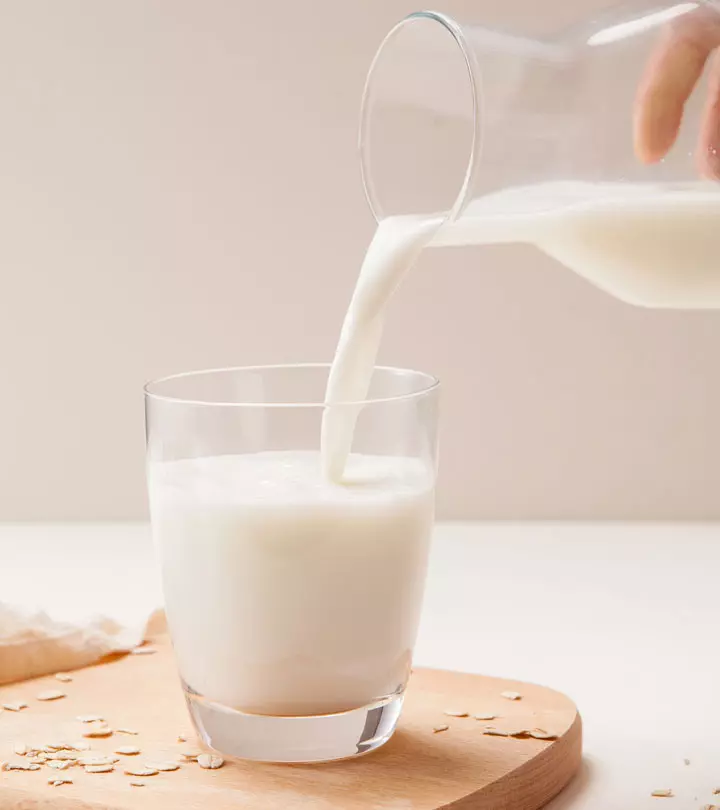
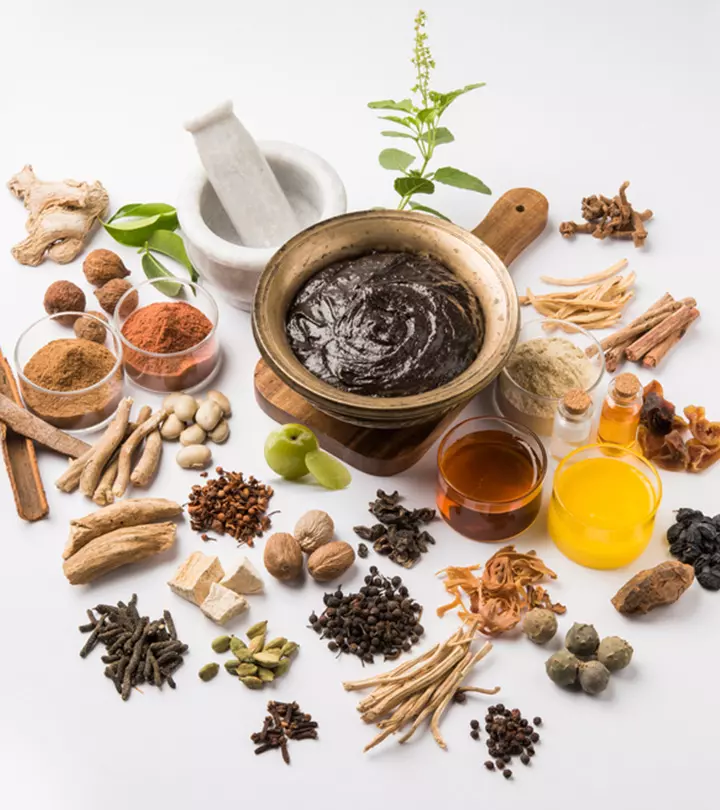
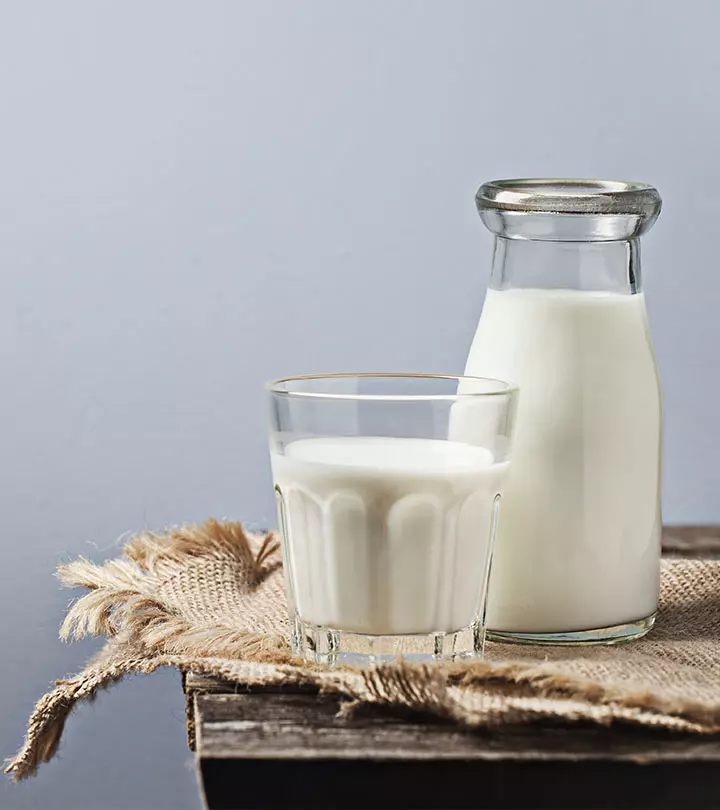
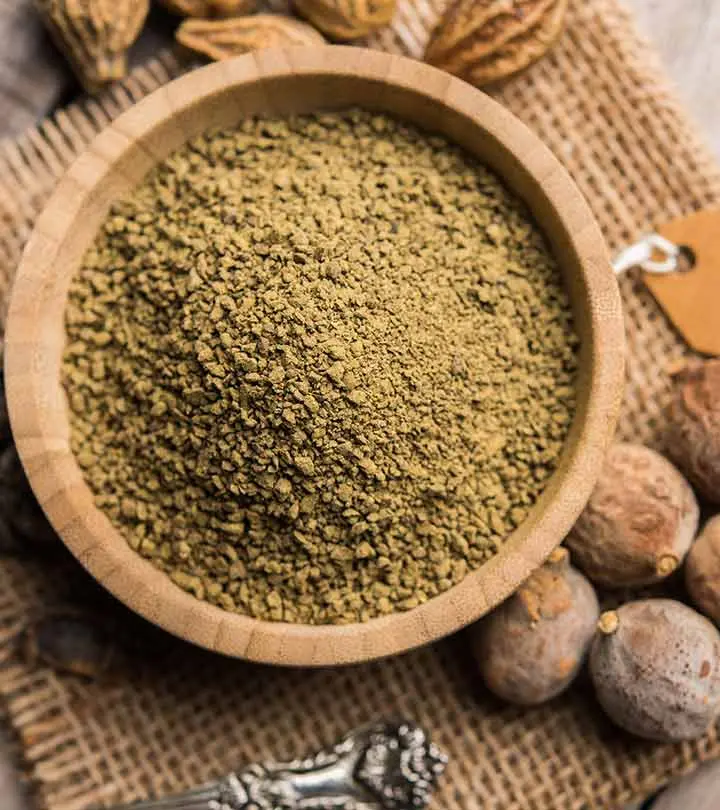
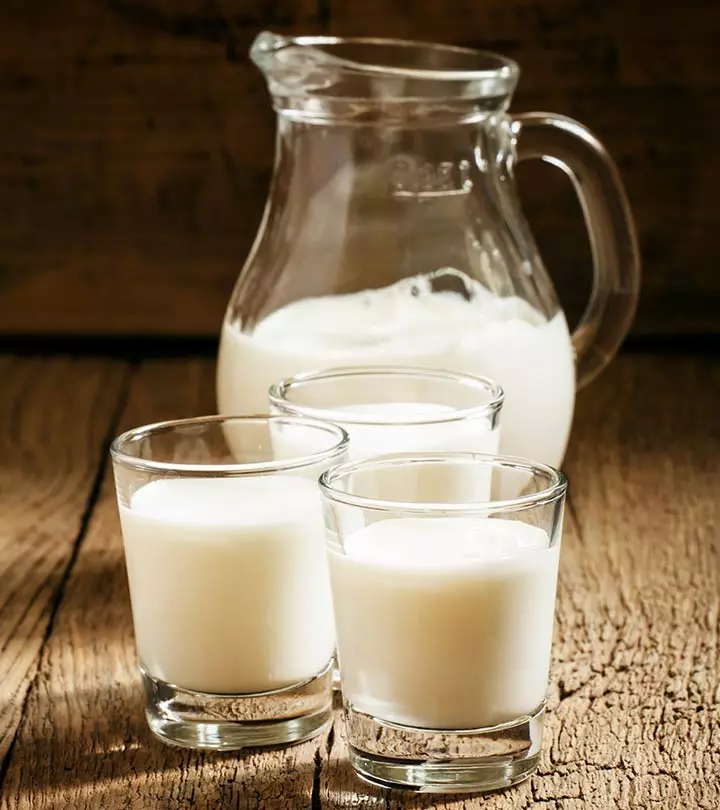
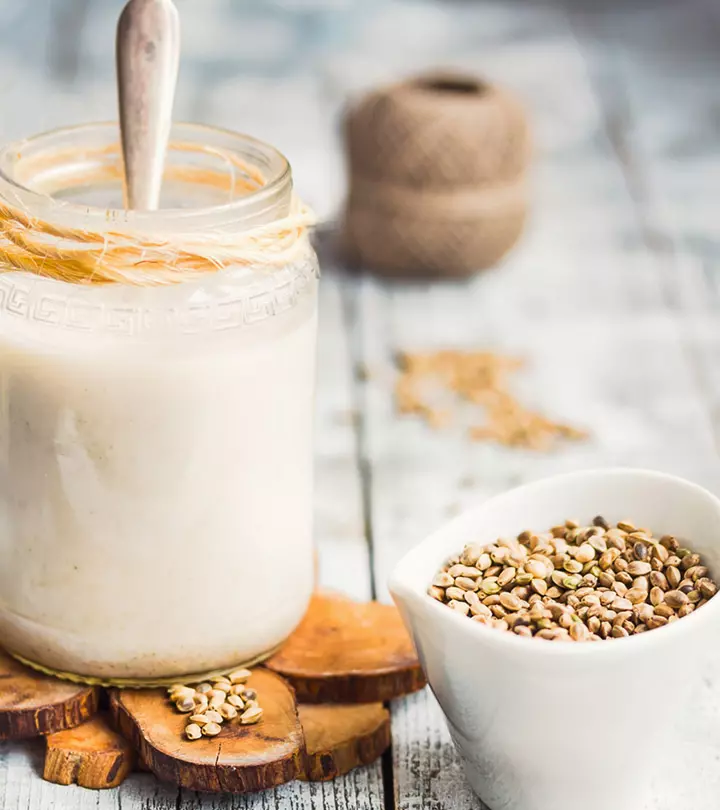
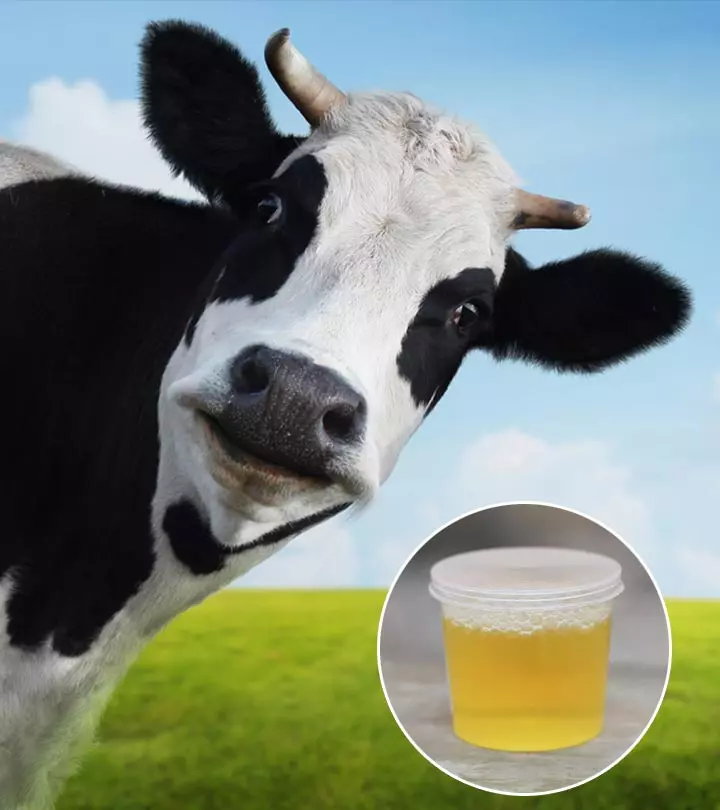



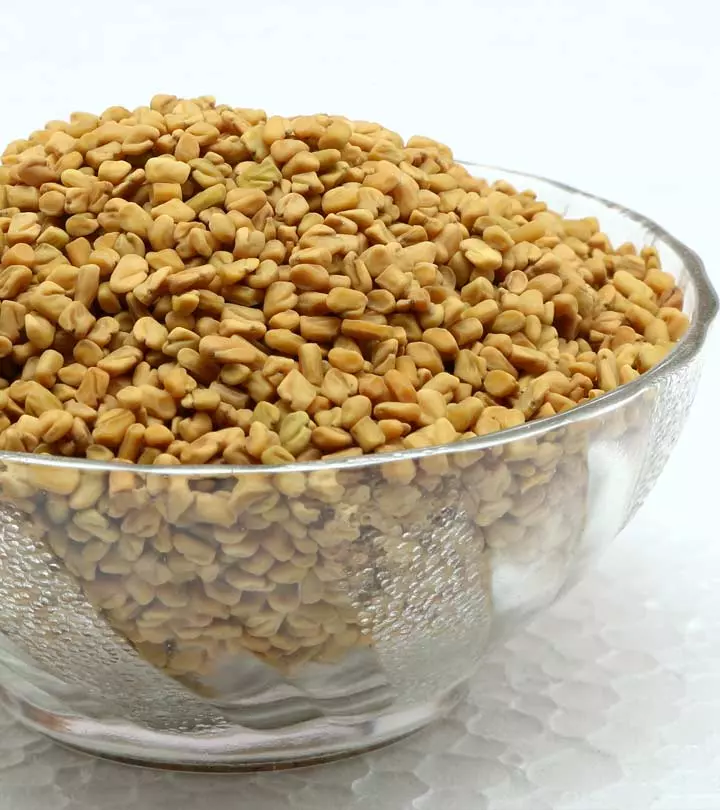


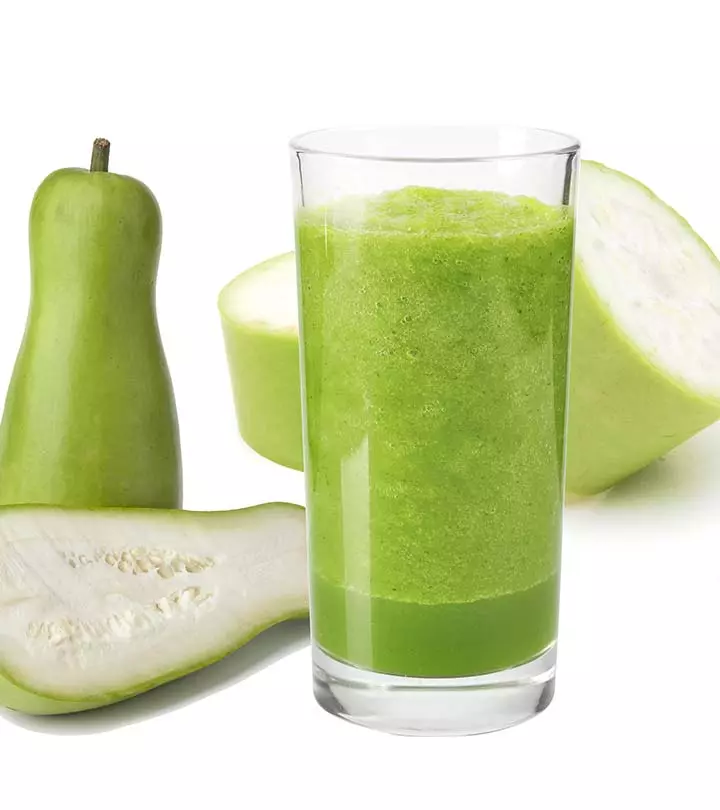
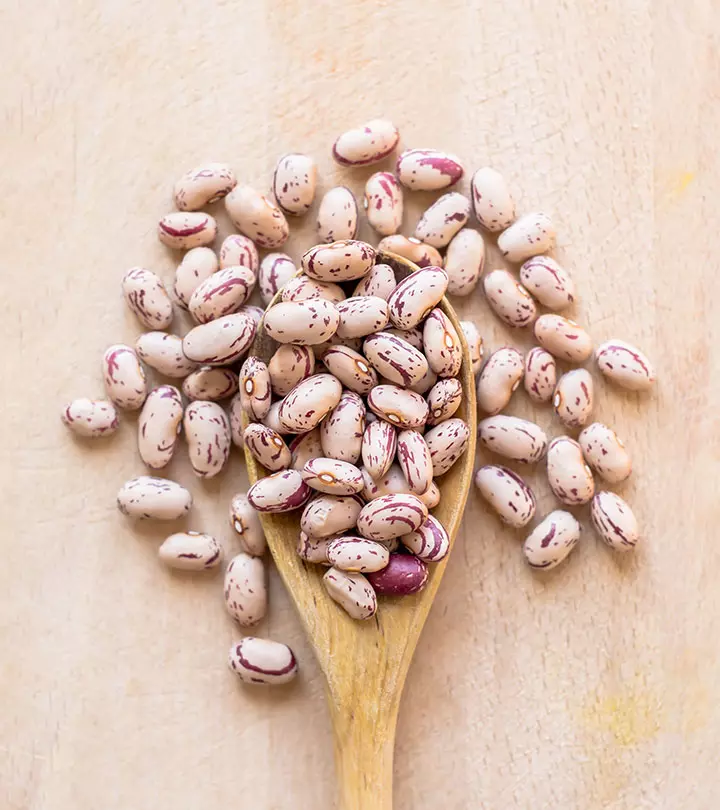
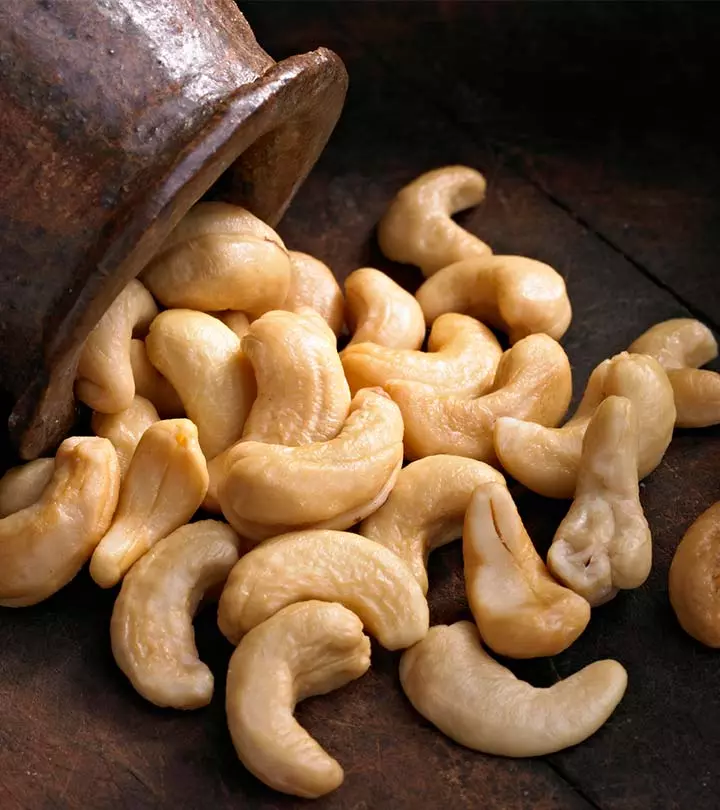
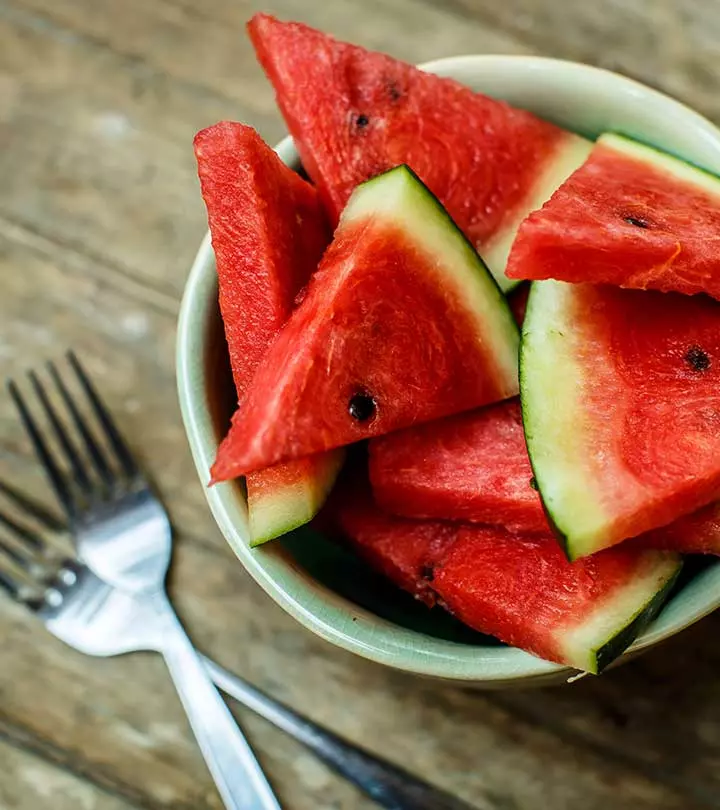
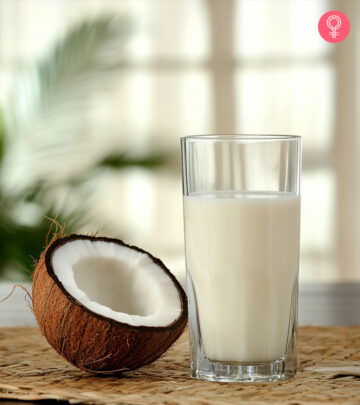
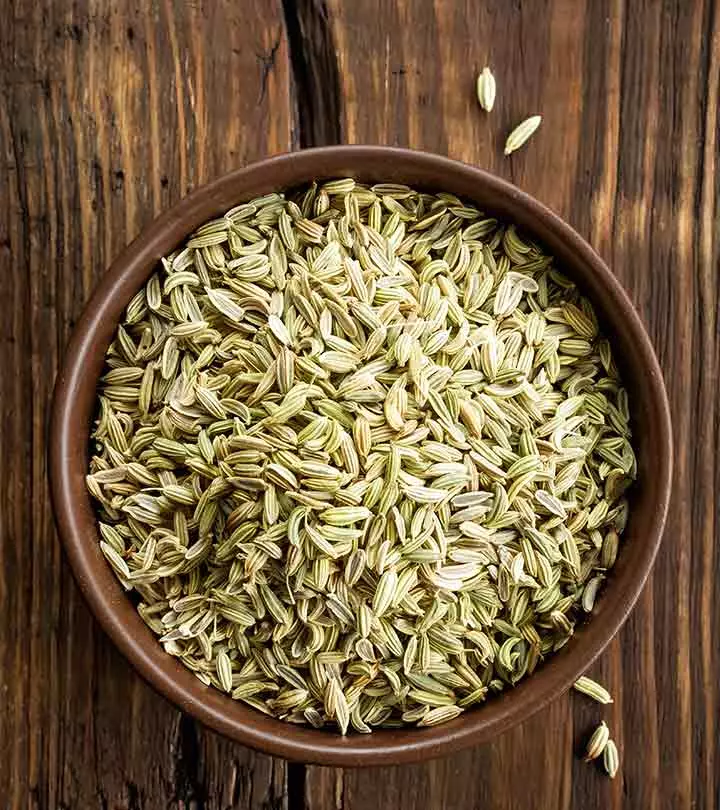
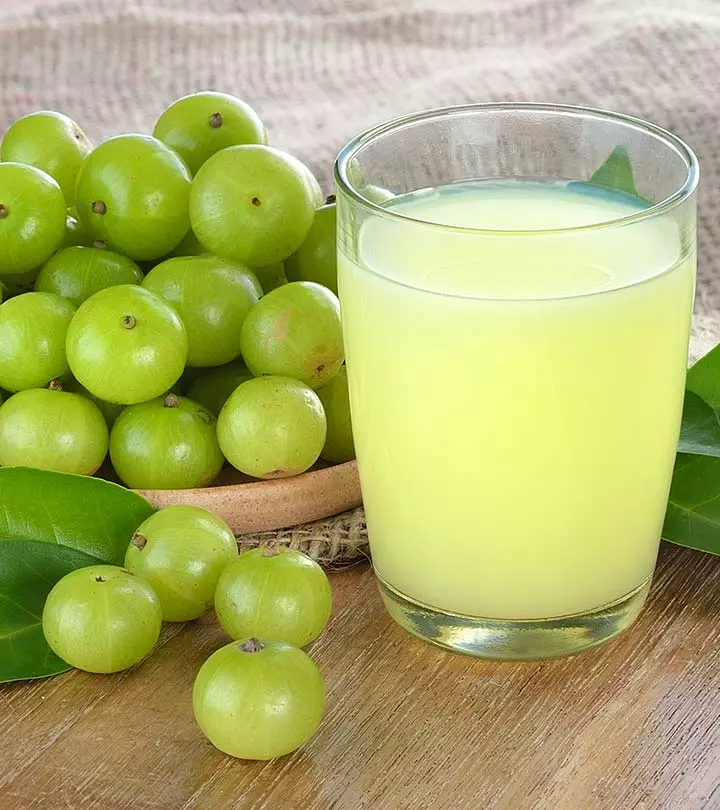
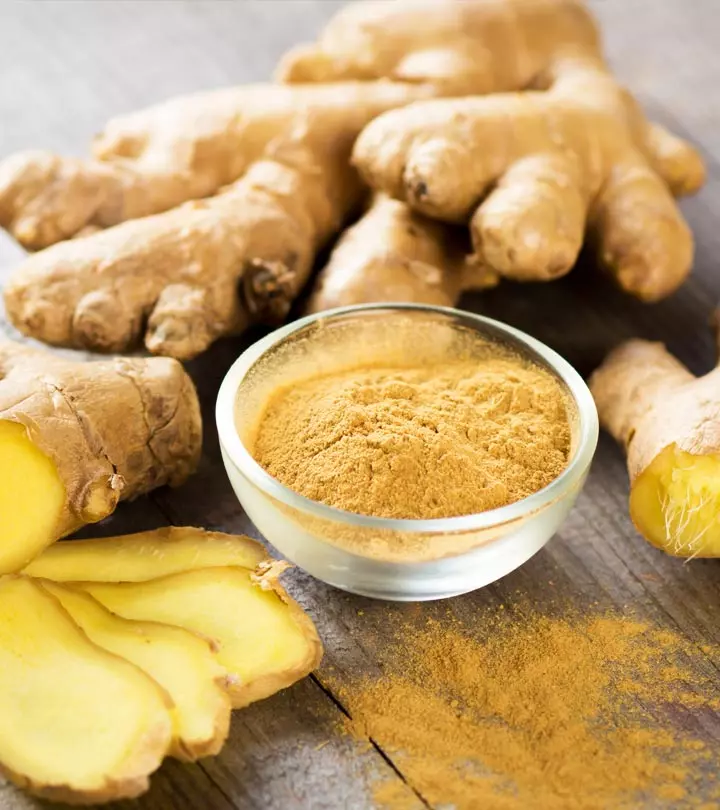
Community Experiences
Join the conversation and become a part of our empowering community! Share your stories, experiences, and insights to connect with other beauty, lifestyle, and health enthusiasts.